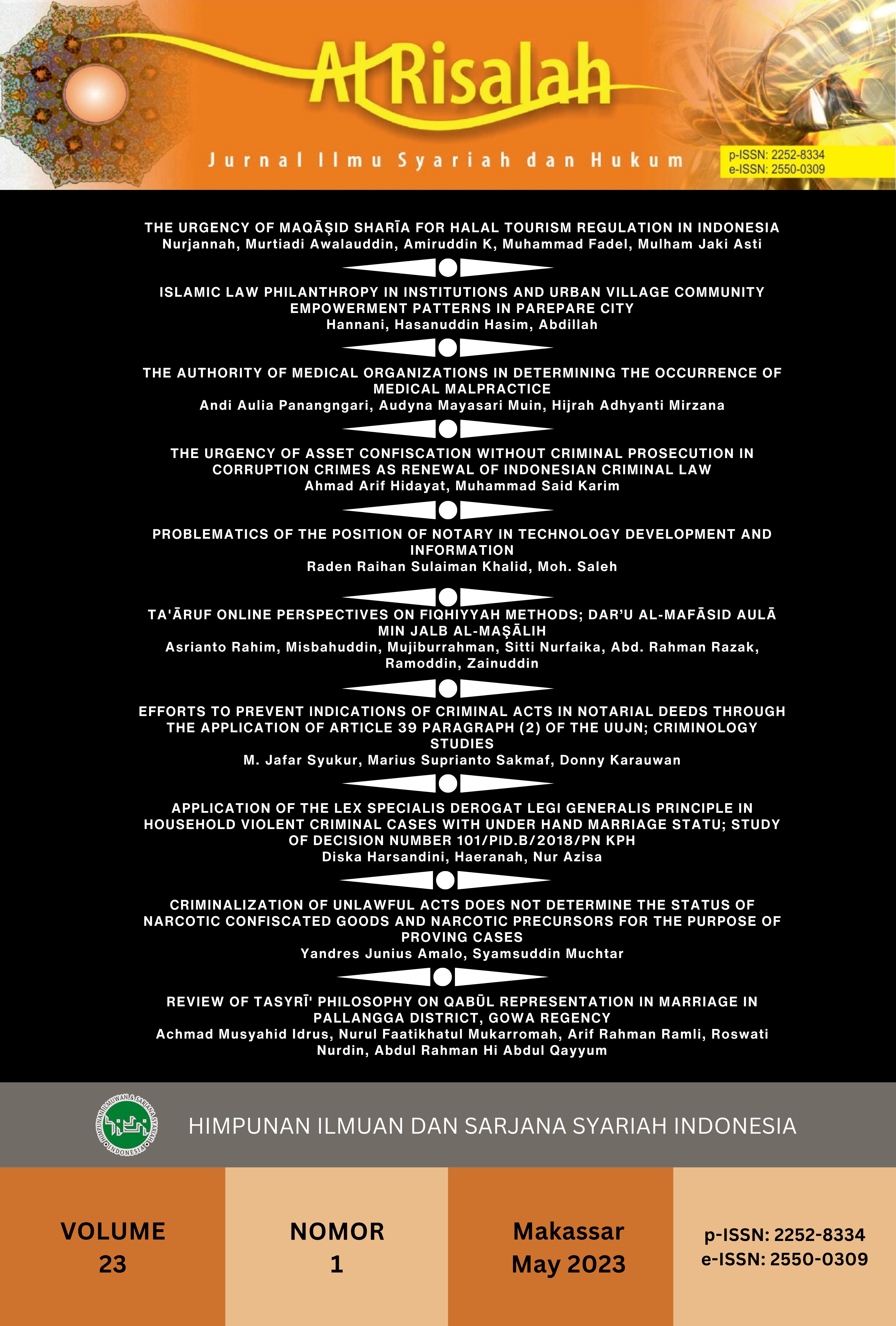ISLAMIC LAW PHILANTHROPY IN INSTITUTIONS AND URBAN VILLAGE COMMUNITY EMPOWERMENT PATTERNS IN PAREPARE CITY
Abstract
Parepare city community empowerment through Parepare Mayor Regulation No. 4 of 2019 concerning Guidelines for Community Empowerment Institutions for the City of Parepare Village is a step by the city government in increasing the empowerment of the keluran community, but it is inversely proportional to the poverty rate from 2019-2022 which has shown a drastic increase, this is what makes researchers want to see the implementation of the mayor's regulations and community empowerment parepare city from an Islamic philanthropic perspective, this research method is a qualitative research using library research and field research methods, Islamic philanthropy and the concept of the Indonesian state are manifested linearly with Parepare Mayor Regulation No.4 of 2019 concerning guidelines for implementing village community empowerment institutions including namely : 1) Facilitate the municipal government of Parepare in preparing and implementing policies that are aspirational and right on target or needed by the community; and 2) Management of LPMK is more structured and systematic. However, the problem with the implementation of these rules lies in human resources, communication and socialization and the massive management of LPMK in Parepare City.
References
Abdullah, Priyatmanto. “Refitalisasi Kewenangan PTUN,” 21. Yogyakarta: Cahaya Atma Pustaka, 2016.
Al-Hamdi, Ridho, David Efendi, Bachtiar Dwi Kurniawan, and Hilman Latief. Politik Inklusif Muhammadiyah: Narasi Pencerahan Islam Untuk Indonesia Berkemajuan. Yogyakarta: UMY Press (dist: Caremedia Communication), 2019.
Budiardjo, Miriam. Dasar-Dasar Ilmu Politik. Gramedia pustaka utama, 2003.
Dahl, Robert. “Democracy and It Critics.” New Heaven Conn, 1983, 50.
Departemen Pendidikan dan Kebudayaan. “Kamus Besar Bahasa Indonesia,” Edisi Kedu., 276. Jakarta: Balai Pustaka, 1989.
Haq, Islamul, Marilang, and Kurniati. “Islamic Criminal Law on Jarimah Zina’s Testimony: Uncovering the Conflicts Between Sharia Doctrine and Reality.” Al-Risalah Jurnal Ilmu Syariah Dan Hukum 22, no. 1 (2022): 52–62. https://doi.org/https://doi.org/10.24252/al-risalah.vi.26792.
Hardiyono, V. “Indonesia Menjawab Konsep Negara Welfare State Dan Tantangannya.” Hukum, n.d., 2.
Hermanto, Asep Bambang. “Politik Hukum Dalam Demokrasi Ekonomi Indonesia.” Jurnal Hukum Dan Bisnis (Selisik) 4, no. 1 (2018): 4–28. https://doi.org/https://doi.org/10.35814/selisik.v4i1.680.
Kusuma, Mulyana W. “Perspektif Teori Dan Kebijaksanaan Hukum,” 19. Jakarta: Rajawali, 1986.
Kusumaatmadja, Mochtar. “Fungsi Dan Perkembangan Hukum Dalam Pembangunan Nasional,” 2–12. Bandung: Binacipta, 1976.
Lismanto, Lismanto, and Yos Johan Utama. “Membumikan Instrumen Hukum Administrasi Negara Sebagai Alat Mewujudkan Kesejahteraan Sosial Dalam Perspektif Negara Demokrasi.” Jurnal Pembangunan Hukum Indonesia 2, no. 3 (2020): 416–33.
Maftufin, Arif. “Filantropi Islam,” 1. yogjakarta: Magnum Pustaka Utama, 2017.
Makhrus. “Dinamika Dan Aktivisme Filantropi Islam Dalam Pemberdayaan Masyarakat,” Edisi pert. Yogyakarta: Litera, 2018.
Manan, Andul. “Dinamika Politik Di Indonesia,” 235. Jakarta: Kencana, 2018.
Mu’Allim. “Interpretasi,” n.d., 45.
Nuranita, and IPDS BPS Kota Parepare. “Indeks Pembangunan Manusia.” ParePARE: BPS Kota Parepare, 2022.
Setiardji, A Gunawan. “Dialektika Hukum Dan Moral Dalam Pembangunan Masyarakat Indonesia,” 113. Yogyakarta: Kanisius, 1990.
Sofyan, Sofyan, Lomba Sultan, Achmad Musyahid, and Mulham Jaki Asti. “Islamic Law Legislation In An Effort To Reform Indonesia’s National Law.” Al-Risalah Jurnal Ilmu Syariah Dan Hukum 22, no. 1 (2022): 93–104. https://doi.org/https://doi.org/10.24252/al-risalah.vi.28369.
Suparji, Suparji. “Implementasi Prinsip Good Governance Dalam Sistem Pengelolaan Keuangan Daerah Di Indonesia.” Jurnal Magister Ilmu Hukum 4, no. 1 (2021): 1–5. https://doi.org/http://dx.doi.org/10.36722/jmih.v4i1.756.
Syarif, Muhammad Fazlurrahman, Dewi Purwanti, and Fahmiah Akilah. “The Perspective of Contemporary Scholars on the Zakat Payment of YouTube Google AdSense Income.” Mazahibuna: Jurnal Perbandingan Mazhab 4, no. 2 (2022): 132–51. https://doi.org/10.24252/MH.VI.31860.
Wijaya, Abdi. “Respon Lembaga Fatwa Terhadap Isu Fikih Kontemporer (Studi Komparatif Lembaga Fatwa MUI, Majelis Tarjih Muhammadiyah Dan Bahtsul Masail NU).” Mazahibuna: Jurnal Perbandingan Mazhab 1, no. 2 (2019): 180–99. https://doi.org/10.24252/mh.v1i2.10624.
Copyright (c) 2023 Hannani, Hasanuddin Hasim, Abdillah

This work is licensed under a Creative Commons Attribution 4.0 International License.


